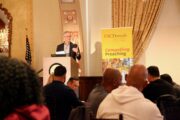This post originally appeared at Trans/Missions, the USC Knight Chair in Media and Religion site.
At about the same time that President Barack Obama came out in favor of gay marriage, and North Carolina amended its constitution to forbid gay marriage, a small group calling itself the Biola Queer Underground announced itself on the campus of Biola University, an evangelical university in southern California. Although it is difficult to tell how large this group is, its website claims “dozens” of members. It is understandably secretive, and no members are publicly identified.
Prior to their coming-out announcement, BQU was in discussion with members of another group related to Biola, this one made up of alumni, faculty and others, called Biola Queers. This group is not so secretive and includes self-identified LBGTQ members as well as those who are sympathetic to their cause. Quite understandably, the public emergence of an LGBTQ group at a conservative evangelical university has garnered a lot of coverage in the Christian press, among Christian bloggers, in the mainstream news media and even from a “friendly atheist” blogger.
I’ve written previously about the emergence of LGBT groups on evangelical university campuses, so I won’t revisit those themes. But the persistence of the issue, along with changes in the larger culture regarding gay marriage and the desire of young LGBT evangelicals to remain within the fold, suggests that we may have arrived at a historical point of division within evangelicalism. This milepost will, in turn, have significance across the cultural and political spectrum.
What strikes me most about BQU and its counterparts at other evangelical colleges is that its members are not only committed to evangelical Christianity but also to the institutions that systematically marginalize them. From my perspective, it would be much easier (and perhaps much more healthy) to leave and find a more accepting place, perhaps even chuck the evangelical belief system altogether. Yet, as members of BQU suggest on the group’s website, a confluence of factors works to keep them at the school: They grew up in a conservative atmosphere and it is comfortable for them; their parents would only pay for a Christian college education; they only realized through their time at college that their identity was LGBT. In short, these young people want to be evangelicals, but they also want to be accepted for who they are.
That’s not an unreasonable aspiration. Recent opinion polls suggest that the younger generation of evangelicals is more accepting of homosexuality than older generations (39 percent of evangelicals 18-29 believe homosexuality should be accepted in society, compared to less than a quarter of evangelicals 34 and older). There are likely many explanations for this change, not the least of which is increasingly positive media representations of LGBTQ people. Because of that openness, younger people in general actually seem to know (and often become good friends with) a more diverse range of people, including LGBTs.
I have argued elsewhere that for religious groups, this exposure to the wider world through media tends to level authority, which is the stock-in-trade of evangelicals and indeed most religious groups. Religious groups need somebody to be in charge who sets the rules to which everybody else has to adhere. With evangelicals this process has historically been not just internal (within particular organizations) but also external (among other evangelical organizations and/or leaders). One word on the radio or from the pulpit by Falwell or Dobson could bring a wayward organization back into line. Now, however, an astonishing array of different groups has a ready platform from which to make their views known.
These developments taken together raise several questions about the future of evangelicalism more broadly, and evangelical colleges and universities more specifically. Most obviously, reporters could focus on the extent to which the question of sexual identity and gender issues more generally will play out in different evangelical institutional settings. And as changes in the larger society make their way into the evangelical world, how will this change the way evangelicals advocate for their beliefs in the public sphere?
Other questions related specifically to evangelical universities are also important. For example, what will future legal changes in the definition of marriage mean for evangelical schools? Historically these schools have been able to maintain a proscription against all sexual acts outside the bonds of marriage, but what will this mean if gay marriage becomes legal? Will this put them at odds with the law and thereby affect their accreditation status? Further, none of these schools has any significant endowment; they are almost completely dependent on annual tuition dollars to operate. And while evangelical colleges like to claim that they don’t take any money from state sources, they actually do in the form of state-funded student scholarships and federally guaranteed loans. What happens if this source of student scholarship money dries up?
In the end, the problem that evangelicals and their universities are encountering—thoughtful, articulate, insightful students and alumni who remain committed to their Christian faith despite their differences with fellow believers—is one of their own making. That is, these young people are the product of a (generally) good college education, in which they learn to think independently and argue for a particular point of view. These abilities are now being turned against the authority of accepted evangelical orthodoxies, not in order to undermine these institutions, but to challenge the way that they act toward committed, yet marginalized, members of their faith. Questions abound, and forward-thinking reporters will begin ask them.
Richard Flory is the executive director of the USC Center for Religion and Civic Culture.







